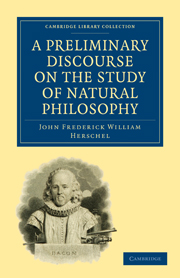Book contents
- Frontmatter
- Contents
- Dedication
- PART I OF THE GENERAL NATURE AND ADVANTAGES OF THE STUDY OF THE PHYSICAL SCIENCES
- PART II OF THE PRINCIPLES ON WHICH PHYSICAL SCIENCE RELIES FOR ITS SUCCESSFUL PROSECUTION, AND THE RULES BY WHICH A SYSTEMATIC EXAMINATION OF NATURE SHOULD BE CONDUCTED, WITH ILLUSTRATIONS OF THEIR INFLUENCE AS EXEMPLIFIED IN THE HISTORY OF ITS PROGRESS
- PART III OF THE SUBDIVISION OF PHYSICS INTO DISTINCT BRANCHES, AND THEIR MUTUAL RELATIONS
- CHAP. I Of the Phenomena of Force, and of the Constitution of Natural Bodies
- CHAP. II Of the Communication of Motion through Bodies. — Of Sound and Light
- CHAP. III Of Cosmical Phenomena
- CHAP. IV Of the Examination of the material Constituents of the World
- CHAP. V Of the Imponderable Forms of Matter
- CHAP. VI Of the Causes of the actual rapid Advance of the Physical Sciences compared with their Progress at an earlier Period
- Index
CHAP. III - Of Cosmical Phenomena
Published online by Cambridge University Press: 29 August 2010
- Frontmatter
- Contents
- Dedication
- PART I OF THE GENERAL NATURE AND ADVANTAGES OF THE STUDY OF THE PHYSICAL SCIENCES
- PART II OF THE PRINCIPLES ON WHICH PHYSICAL SCIENCE RELIES FOR ITS SUCCESSFUL PROSECUTION, AND THE RULES BY WHICH A SYSTEMATIC EXAMINATION OF NATURE SHOULD BE CONDUCTED, WITH ILLUSTRATIONS OF THEIR INFLUENCE AS EXEMPLIFIED IN THE HISTORY OF ITS PROGRESS
- PART III OF THE SUBDIVISION OF PHYSICS INTO DISTINCT BRANCHES, AND THEIR MUTUAL RELATIONS
- CHAP. I Of the Phenomena of Force, and of the Constitution of Natural Bodies
- CHAP. II Of the Communication of Motion through Bodies. — Of Sound and Light
- CHAP. III Of Cosmical Phenomena
- CHAP. IV Of the Examination of the material Constituents of the World
- CHAP. V Of the Imponderable Forms of Matter
- CHAP. VI Of the Causes of the actual rapid Advance of the Physical Sciences compared with their Progress at an earlier Period
- Index
Summary
Astronomy and Celestial Mechanics.
(293.) Astronomy, as has been observed in the former part of this discourse, as a science of observation, had made considerable progress among the ancients: indeed, it was the only branch of physical science which could be regarded as having been cultivated by them with any degree of assiduity or real success. The Chaldean and Egyptian records had furnished materials from which the motions of the sun and moon could be calculated with sufficient exactness for the prediction of eclipses; and some remarkable cycles, or periods of years in which the lunar eclipses return in very nearly the same order, had been ascertained by observation. Considering the extreme imperfection of their means of measuring time and space, this was, perhaps, as much as could have been expected at that early period, and it was followed up for a while in a philosophical spirit of just speculation, which, if continued, could hardly have failed to lead to sound and important conclusions.
(294.) Unfortunately, however, the philosophy of Aristotle laid it down as a principle, that the celestial motions were regulated by laws proper to themselves, and bearing no affinity to those which prevail on earth. By thus drawing a broad and impassable line of separation between celestial and terrestrial mechanics, it placed the former altogether out of the pale of experimental research, while it at the same time impeded the progress of the latter by the assumption of principles respecting natural and unnatural motions, hastily adopted from the most superficial and cursory remark, undeserving even the name of observation.
- Type
- Chapter
- Information
- A Preliminary Discourse on the Study of Natural Philosophy , pp. 265 - 289Publisher: Cambridge University PressPrint publication year: 2009First published in: 1830

